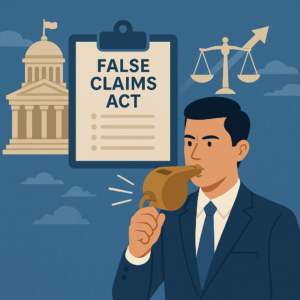February 14, 2025 | Posted By: Emma Doull
 At Hoyer Law Group, our whistleblower attorneys stay on the front lines of change—closely monitoring how legal and political developments impact False Claims Act (“FCA”) enforcement. In our view, the FCA remains the government’s most potent tool to fight fraud, and for whistleblowers, it’s a gateway to exposing wrongdoing and recovering substantial awards.
At Hoyer Law Group, our whistleblower attorneys stay on the front lines of change—closely monitoring how legal and political developments impact False Claims Act (“FCA”) enforcement. In our view, the FCA remains the government’s most potent tool to fight fraud, and for whistleblowers, it’s a gateway to exposing wrongdoing and recovering substantial awards.
This blog breaks down recent government actions, legal rulings, and statutory updates that affect FCA enforcement and the viability of qui tam lawsuits in 2025. Understanding these shifts is critical if you’re considering becoming a whistleblower or need help navigating an FCA case.
DOJ Reports Record Surge in Whistleblower Lawsuits
The U.S. Department of Justice (DOJ) announced over $2.9 billion in False Claims Act recoveries in fiscal year 2024—the highest amount in three years. More notably, whistleblowers filed 979 qui tam lawsuits, a 37% jump from the prior year and the highest ever recorded. These recoveries spanned a range of industries:
-
Healthcare accounted for 57% of the total ($1.7 billion), with cases tied to illegal referrals, kickbacks, and opioid marketing.
-
Defense and energy sectors also saw major settlements, including a $70 million payment by Sikorsky Support Services for overcharging the U.S. Navy.
DOJ officials emphasized in the DOJ announcement that they consider whistleblowers “critical” in uncovering fraud. Despite constitutional challenges to qui tam authority in some federal courts, the DOJ is vigorously defending whistleblower rights as it appeals recent adverse rulings.
Anti-Kickback Law: Broad Interpretation Strengthens FCA Claims
A recent ruling by the Fourth Circuit Court of Appeals reaffirmed the broad reach of the Anti-Kickback Statute (AKS), which frequently overlaps with FCA claims. The case involved a pharmaceutical-backed charity, the Pharmaceutical Coalition for Patient Access (PCPA), which proposed subsidizing drugs for Medicare patients.
The court ruled that this constituted an illegal quid pro quo, confirming that “remuneration” includes indirect payments that influence patient behavior, even absent direct corruption.
This interpretation aligns with the DOJ’s aggressive enforcement against drugmakers and healthcare providers offering anything of value in return for referrals or purchases. FCA relators alleging kickback schemes—especially in the healthcare space—may benefit from this broader definition of liability.
A New Tool for Civil Fraud: The Administrative False Claims Act (AFCA)
A lesser-known but significant development is revamping the Program Fraud Civil Remedies Act, now renamed the Administrative False Claims Act under the 2025 National Defense Authorization Act. The updated law:
-
Increases the fraud claim limit from $150,000 to $1 million,
-
Allows administrative agencies to settle low-dollar fraud cases directly and
-
Expands who can preside over these cases.
Though the AFCA does not include a qui tam provision, it may complement FCA enforcement by targeting more minor violations and encouraging early settlements. Whistleblowers should be aware of its implications, especially when negotiating FCA settlements. Contractors should also ensure compliance with FAR 52.203-13 mandatory disclosure rules to avoid exposure under both statutes.
Impact of Trump-Era Executive Orders on FCA-Related Oversight
Federal contractors should brace for uncertainty following several executive orders issued by President Trump in early 2025. Among the key developments:
-
Executive Order “Ending Illegal Discrimination and Restoring Merit-Based Opportunity” eliminated Executive Order 11246, removing long-standing diversity and affirmative action obligations for contractors enforced by the Office of Federal Contract Compliance Programs (OFCCP).
-
The revocation of DEI programs and removal of contractor bias investigations could reduce certain regulatory pressures but may create inconsistencies across agencies. As contractors adjust, ambiguous guidance may expose them to inadvertent non-compliance or missteps, especially if whistleblowers report related misconduct.
Contractors are urged to maintain clear documentation and seek specific written directives from contracting officers, as general executive guidance does not supersede contractual obligations under the Federal Acquisition Regulation.
What This Means for Whistleblowers
Now more than ever, whistleblowers have leverage. The government is ramping up FCA enforcement, especially in healthcare, defense contracting, and federal grant spending. Meanwhile, expanded administrative tools and evolving interpretations of laws like the Anti-Kickback Statute make pursuing a wider range of fraud easier.
However, navigating the FCA landscape is more complex, particularly with political shifts and legal challenges affecting agency enforcement and court interpretations.
At Hoyer Law Group, we help whistleblowers:
- File FCA and qui tam lawsuits with the strongest legal footing,
- Understand eligibility for whistleblower rewards,
- Navigate retaliation protections, and
- Maximize the impact of their disclosures.
To learn more about how we assist whistleblowers, visit our Whistleblower Practice page.
Final Thoughts
Despite political headwinds and new legal tools, the False Claims Act remains a potent avenue for rooting out fraud against the government—and whistleblowers are central to that mission. With government recoveries on the rise and courts broadly interpreting key statutes, this is a critical time for those aware of fraud to step forward.
If you believe you have information about fraud against the government, contact us for a confidential consultation. We can help you determine if you have a viable FCA claim—and guide you through every step of the process.

